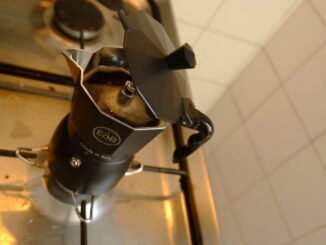
Discover how the Cezve/Ibrik Championship is bridging the gap between a centuries-old brewing method and specialty coffee.
BY VASILEIA FANARIOTI
SPECIAL TO BARISTA MAGAZINE ONLINE
Cover photo courtesy of Mariam Erin
From the editor: Lately at Barista Mag Online, we’ve been discussing the importance of the cezve/ibrik and its place in the specialty world. Today we continue this discussion by chatting about the Cezve/Ibrik Championship, and what factors go into planning, producing, and winning the competition.
In the world of professional coffee competitions, there is one that is lesser-known but no less intense. The ibrik championship is a competition where baristas from all around the world compete to see who can make the best cup of coffee with the help of an ibrik (also known as “cezve” in some countries), the oldest coffee brewer in the world.
To find out more about the Cezve/Ibrik Championship (CIC) we had a chat with Mariam Erin, 2022 UAE Cezve/Ibrik champion, and Stavros Lamprinidis, 2014 World Cezve/Ibrik Champion and Specialty Coffee Association (SCA) World Coffee Championships judge.
A New Competition Emerges
The first CIC competition was held in 2009 in Cologne, Germany. However, the competition has not always been well-received due to a lack of knowledge, experience in brewing with an ibrik, and rigidity with the initial setup.
Many national SCA chapters used to struggle to find enough competitors to justify hosting the event. After Stavros won the 2014 competition in Rimini, Italy, he helped revise the rules and regulations that were in place to appeal to more competitors.
“I suggested to the SCA events committee that they mix the rules of the Barista and CIGS competitions with CIC to attract more interest from coffee professionals,” Stavros explains. Moving forward, the ibrik rules would also incorporate elements like the use of alcohol and signature drinks. Up until that point, the countries that would most often host the championships were Greece, Romania, Turkey, and Italy—where the ibrik is better known.
In 2015, the MENA region (Middle East and North Africa) saw its first ibrik championship in Dubai. This was a landmark event not just for the region, but for the competition as a whole.
Since then, the interest in the ibrik championship has been growing steadily. The next championship is going to take place during the World of Coffee in Milan June 23-25, and this time quite a few countries are going to be taking part, including Poland, Sweden, Hungary, Romania, Turkey, UAE, Italy, Greece, and Saudi Arabia.
Breaking Down the Cezve/Ibrik Championship
The current rules and regulations of the ibrik championship encourage participants to showcase their creativity and skills. Competitors must prepare two drinks (a simple cezve/ibrik and a signature cezve/ibrik) for each of the two sensory judges, for a total of four drinks. They are given a 15-minute time limit to do so.
The SCA also encourages competitors to bring their own cultural twist or flair to their performance. The judges expect to try drinks that offer a harmonious balance of sweetness, acidity, and bitterness. Any ingredients used should highlight the qualities of the coffee that the competitor has chosen.
As for the competitors themselves, judges are looking for a champion who has strong interest in keeping the tradition of the ibrik alive—someone who, aside from possessing craftsmanship and service skills, can also be a source of inspiration to others.
Rediscovering the Oldest Brewer in the World
Perhaps the most interesting aspect of the ibrik’s presence in the SCA World Coffee Championships is witnessing the traditional and the modern coming together.
So far, many competitors have used modern techniques alongside the centuries-old brewer. Examples include the use of the AeroPress, the siphon during the CIC competition, or even the use of the ibrik during the World Coffee In Good Spirits Championship.
The ibrik championship is a great way to rediscover an old brewing method and give it new life in the hands of skilled baristas. Mariam explains that this is the main reason she chose to compete.
“The stage became my way of sharing how ibrik can be so detailed and interesting in many ways, just by playing and learning more about the variables. It all comes down to highlighting the quality of the coffee using this traditional brewing method,” she says.
If you want to learn more about this unique coffee brewing method and where it fits in the specialty-coffee world, check out our recent article on the subject.
ABOUT THE AUTHOR
Vasileia Fanarioti (she/her) is a freelance copywriter and editor with a primary focus on the coffee niche. She has also been a volunteer copywriter for the I’M NOT A BARISTA NPO, providing content to help educate people about baristas and their work. You can follow her adventures at thewanderingbean.net.




